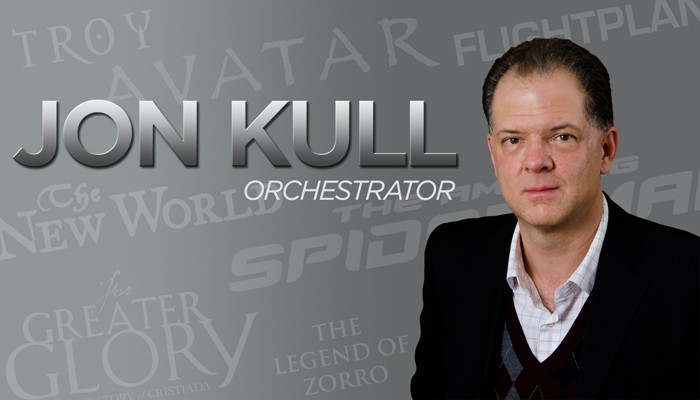
|
«Honor the composer’s intent – make sure his music sounds fabulous!» We had therefore the great pleasure of interviewing Jon Kull, who worked with James Horner on scores including Avatar and The Amazing Spider-Man. The delicacy of his answers sheds light on the creation of orchestrations in film music. How did you become an orchestrator in Hollywood? What is your background? After earning Bachelor’s degrees in Composition and Piano Performance at the University of Colorado, I got into the Film Scoring Program at the University of Southern California. Along with being a wonderful practicum that covered just about every aspect of music production – and having a faculty that boasted many well-known industry professionals – USC was a great place to develop professional contacts. How would you describe your job? In cold, mechanical terms, orchestration is simply the act of assigning all the parts of an alreadywritten composition throughout the orchestra. In practice, you really have to bring a certain sensitivity to your work, being mindful of the composer’s preferences as well as the requirements of the film. The most important thing is to honor the composer’s intent – and, of course, to make sure his music sounds fabulous! What is it that you enjoy about being an orchestrator? First and foremost is the opportunity to work with such talented, dynamic composers on their film scores. I also like that there’s a creative aspect of the job, in a way. Naturally you’re there to serve the composer’s music, but I find you can still put a little bit of yourself into the work here and there. And the fact that it all has to be turned out so quickly, while undeniably stressful at times, can be pretty exhilarating. The immediacy of hearing something you orchestrated the night before being performed by a roomful of top-notch musicians on a recording stage that morning has always struck me as kind of miraculous. All this, and I get paid, too! Do you have other occupations apart from orchestrating? Do you compose sometimes? Most recently I co-wrote a musical, Plug, which my writing partner Steve Stajich and I am currently in the process of shopping. I have composed extensively for a production library (Mega-trax), as well as several commercials. I’ve scored a couple of movies on my own, and I’ve also conducted occasionally. Since 1991 you have participated in more than 150 soundtracks. Which ones are your most favorite? You work a lot with James Newton Howard. Is he a composer you appreciate? You have worked seven times with James Horner since Troy in 2004. How does the work proceed with him? Would you have an anecdote about your collaboration with him to share? The first time I met him in person was at the preliminary meeting for Troy. Randy Kerber had called me and a couple of other orchestrators (Conrad Pope and Eddie Karam) to help him out, as it was a very tight schedule. We all met at Todd-AO studio, where Horner was finishing up on another movie before turning his attention to Troy. I could tell we were in for a whirlwind couple of weeks, but James projected such an air of confidence. Really, he seemed very calm and in control. I’ve thought many times about how that quality is what has helped see him through some challenging projects, as Troy was. That first impression has always stuck with me. (Regarding James Horner and James Newton Howard) How do you approach their projects in terms of orchestration? Are they accurate (and maybe thorough) with the use of instruments and soloists or do you have certain liberty? They’re both pretty specific about primary colors, Horner in particular. I do think the makeup of his orchestral palette is settled for him the moment he first sees a film. And since he sketches directly to orchestral score paper there’s little doubt about which voice goes where. Regarding both composers, I’m not doing any major overhauls of their orchestration. I keep my contributions and suggestions on a limited scale, and I put them into the score in such a way that they’re not obligated to use them. What are the different approaches when it comes to orchestrating different styles of music, such as thriller, action, drama or epic scores? How are recording sessions scheduled for an orchestrator? Are you involved even during the recording sessions or does your job end ahead of that? And if you are involved during the recording sessions, how does that take place? Orchestrators technically aren’t required to attend the recording sessions, although I will try to show up if I’m not still working on cues, which happens a lot. Oftentimes the principal orchestrator will serve as the booth reader (responsible for checking the accuracy of takes against the score) or, in some cases, the conductor. For example, Pete Anthony is both the lead orchestrator and conductor for James Newton Howard, and Jeff Atmajian usually works the booth for James in addition to orchestrating. If Jeff’s not available to work a session, I may then get called to fill in. Thank you to Jon Kull for his kindness and for the time he generously devoted to us.
|
Questions & Interview: Jean-Baptiste Martin Questions & Translation into Spanish: Asier G. Senarriaga Article published in collaboration with jameshorner-filmmusic.com Special thanks to Jean-Baptiste Martin for making possible this first collaboration between our sites. |


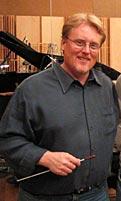 A couple of classmates actually got me started in orchestration. Randy Miller had begun working as a composer and called me to help finish the orchestration for a film he was scoring (And You Thought Your Parents Were Weird!). Another student from the program, Peter Tomashek, was his lead orchestrator, so it was truly all in the family. Not long after that, another classmate, Pete Anthony, got a gig orchestrating for Christopher Young on Jennifer 8 and hired me to proof his work. This eventually led to my also doing some orchestration for Chris, as well as other composers that Pete worked for. In addition, I was able to work for awhile as a proofreader for Patrick Russ, a job that Pete held before me. Pat orchestrated for Maurice Jarre and Elmer Bernstein, so, needless to say, watching him work was an invaluable education! I feel like I acquired many of the requisite tools for the job under Pat’s mentorship.
A couple of classmates actually got me started in orchestration. Randy Miller had begun working as a composer and called me to help finish the orchestration for a film he was scoring (And You Thought Your Parents Were Weird!). Another student from the program, Peter Tomashek, was his lead orchestrator, so it was truly all in the family. Not long after that, another classmate, Pete Anthony, got a gig orchestrating for Christopher Young on Jennifer 8 and hired me to proof his work. This eventually led to my also doing some orchestration for Chris, as well as other composers that Pete worked for. In addition, I was able to work for awhile as a proofreader for Patrick Russ, a job that Pete held before me. Pat orchestrated for Maurice Jarre and Elmer Bernstein, so, needless to say, watching him work was an invaluable education! I feel like I acquired many of the requisite tools for the job under Pat’s mentorship.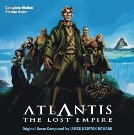 I have a lot of favorites, but let me rattle off a few that come to mind. The scores I’ve enjoyed working on the most are generally ones that have stretched me in some way. I’d put Urban Legends in that category because of all the extended techniques we were called on to use. Atlantis: The Lost Empire is a favorite for one cue in particular («Fireflies») that was bigger and more ‘epic’ than anything else I’d orchestrated to that point. Troy, because it was for a composer I’d always admired since my college days. King Kong, if only for the extreme conditions under which the score was created, and the quality that was achieved despite that – the composer’s and the Hollywood music community’s finest hour, if you ask me. Monster House was memorable for being a rare instance where I was the lead orchestrator, and it’s a terrific score to boot. And Avatar, because it was Avatar – a groundbreaking movie with a score that’s so rich and wellconceived, it felt like a privilege to work on it.
I have a lot of favorites, but let me rattle off a few that come to mind. The scores I’ve enjoyed working on the most are generally ones that have stretched me in some way. I’d put Urban Legends in that category because of all the extended techniques we were called on to use. Atlantis: The Lost Empire is a favorite for one cue in particular («Fireflies») that was bigger and more ‘epic’ than anything else I’d orchestrated to that point. Troy, because it was for a composer I’d always admired since my college days. King Kong, if only for the extreme conditions under which the score was created, and the quality that was achieved despite that – the composer’s and the Hollywood music community’s finest hour, if you ask me. Monster House was memorable for being a rare instance where I was the lead orchestrator, and it’s a terrific score to boot. And Avatar, because it was Avatar – a groundbreaking movie with a score that’s so rich and wellconceived, it felt like a privilege to work on it.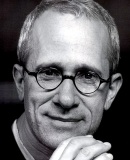 Most definitely! James is an excellent composer who has, I think, a great gift for blending traditional orchestral elements with electronic textures. He’s constantly exploring new sonorities and approaches, and that takes his music to some very compelling and provocative places. I always learn a lot when I get to orchestrate for him.
Most definitely! James is an excellent composer who has, I think, a great gift for blending traditional orchestral elements with electronic textures. He’s constantly exploring new sonorities and approaches, and that takes his music to some very compelling and provocative places. I always learn a lot when I get to orchestrate for him. Typically I’ve been called after J.A.C. Redford and/or Randy Kerber have been working for awhile. Troy and Avatar were exceptions to this, but mostly I’ve been brought on as a middle to late-inning relief. James often meets with his orchestrators in person, at his studio. We’ll look at individual scenes with his accompanying handwritten cue sketch at the piano, with James playing through it and stopping to discuss key moments in the cue. Then, it’s back to the Batcave! If I have a question later he’s available to talk, but we record our meetings and his notes are quite specific and thorough. On a couple of projects he’s had to augment his usual routine by producing synth mockups of each cue. This obviously reflects the now-widespread practice of having composers demo their scores electronically before heading to the recording stage, and it does change the flow a little bit.
Typically I’ve been called after J.A.C. Redford and/or Randy Kerber have been working for awhile. Troy and Avatar were exceptions to this, but mostly I’ve been brought on as a middle to late-inning relief. James often meets with his orchestrators in person, at his studio. We’ll look at individual scenes with his accompanying handwritten cue sketch at the piano, with James playing through it and stopping to discuss key moments in the cue. Then, it’s back to the Batcave! If I have a question later he’s available to talk, but we record our meetings and his notes are quite specific and thorough. On a couple of projects he’s had to augment his usual routine by producing synth mockups of each cue. This obviously reflects the now-widespread practice of having composers demo their scores electronically before heading to the recording stage, and it does change the flow a little bit.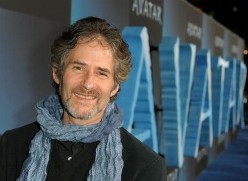 With Horner there’s usually a fair amount of separation of colors, and less layering. He has definite ideas about what he wants to hear, coupled with an impressive command of the orchestra, so I stick to what he’s given me, keeping things pure and not too embellished. Newton Howard is rather heavily influenced by the audio image of his orchestra, not to mention the layering of percussive and electronic elements that are more of a feature in his music. So with him it’s important for the orchestra to have some body and presence in all the families – strings, winds, and brass. More often than not I try to make each instrumental group complete in itself.
With Horner there’s usually a fair amount of separation of colors, and less layering. He has definite ideas about what he wants to hear, coupled with an impressive command of the orchestra, so I stick to what he’s given me, keeping things pure and not too embellished. Newton Howard is rather heavily influenced by the audio image of his orchestra, not to mention the layering of percussive and electronic elements that are more of a feature in his music. So with him it’s important for the orchestra to have some body and presence in all the families – strings, winds, and brass. More often than not I try to make each instrumental group complete in itself.

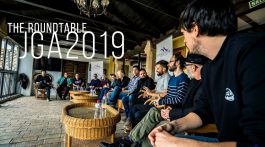
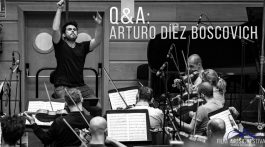
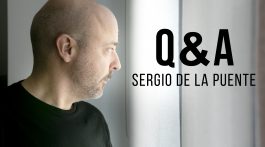
No hay comentarios